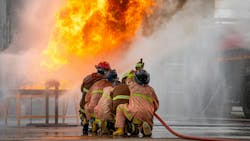U.S. Chemical Safety Board Marks 20th Anniversary of Fatal BP Blast
Related Reading: From the Archives
The U.S. Chemical Safety and Hazard Investigation Board (CSB) marked the 20th anniversary of the fatal BP America refinery blast in Texas City, Texas, with a new report summarizing the key lessons learned from the incident.
The fire and explosion, which occurred March 23, 2005, resulted in 15 deaths and severe injuries to 180 others.
The new report highlights key recommendations the agency made after investigating the accident and steps the chemical industry has taken since the incident to improve safety.
“The BP Texas City disaster is one of the worst industrial accidents in recent U.S. history,” said CSB Chair Steve Owens. “As a result of the CSB’s investigation of this terrible incident and the more than two dozen safety recommendations that the CSB made, a number of important steps have been taken to improve practices at refineries and other chemical facilities. But more still needs to be done to protect workers and communities. The CSB is committed to ensuring that a catastrophe like this never happens again.”
CSB’s final report on the incident, released in 2007, found organizational and safety deficiencies at all levels within BP as well as gaps in industry standards and practices that allowed the incident to occur.
Based on its findings, CSB issued 26 safety recommendations to nine entities. All but one of those recommendations have been implemented, leading to improvements in process safety management at chemical and petrochemical facilities across the country, said the CSB in a press statement.
The only recommendation not yet implemented relates to revisions in the Occupational Safety and Health Administration’s management of change process.
About the Author
Amanda Joshi
Managing Editor
Amanda Joshi has more than 18 years of experience in business-to-business publishing for both print and digital content. Before joining Chemical Processing, she worked with Manufacturing.net and Electrical Contracting Products. She’s a versatile, award-winning editor with experience in writing and editing technical content, executing marketing strategy, developing new products, attending industry events and developing customer relationships.
Amanda graduated from Northern Illinois University in 2001 with a B.A. in English and has been an English teacher. She lives in the Chicago suburbs with her husband and daughter, and their mini Aussiedoodle, Riley. In her rare spare time, she enjoys reading, tackling DIY projects, and horseback riding.

